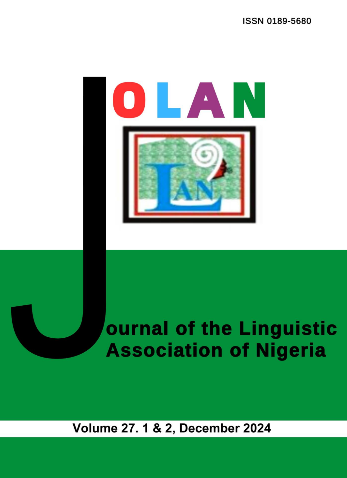Examining Diglossic Status in Political Domain: A Case Study of Ekiti State 2014 Governoship Election Campaign
Keywords:
Language use, High, Low, Diglossia Campaign speechAbstract
The traditional linguistic situation of a diglossic community posits by Ferguson (1959) is a stable one. However, several scholars have attempted to redefine and modify Ferguson’s concept of diglossia by examining the linguistic status of the language varieties used within a speech community or a nation and their functionality. The aim of this study include, to establish the political domain classification for possible ascertaining of the variety mostly suitable for use; to investigate the stability of the diglossic status of the varieties in use in political domain, and to investigate if there is a common ground (a domain), in which both High (H) and Low (L) varieties can function simultaneously. The data for this study was collected through tape recording of the campaign rallies of the three leading political parties that participated in the 2014 Èkìtì State governorship election and through participant observation. The political parties are All Progressives Congress (APC), Peoples Democratic Party(PDP), and Labour Party (LP). We found out in this study that Ferguson’s functionality parameter for High and Low varieties in diglossic situation cannot be generalized in all sociolinguistic domains. For instance, in political domains especially, when it comes to language use in political campaigns; and as such, there is room for differentiating between formal and informal domains. Consequently, politicians result to the use of both the standard language (High variety) and its various dialect(s) (Low varieties) to communicate their intentions.
References
Agunbiade, F.O. (2016). “A Socio-Pragmatic Study of Language Use in Èkìtì State 2014 Governorship Election”. Unpublished M.A Thesis. Èkìtì State University.
Ahukanna, J.G.W. (1990), “Bilingualism and Code-Mixing in Language Use in Nigeria: The Case of IgboEnglish Bilinguals”. In Emenanjo, E.N. (ed.) Multilingualism, Minority Languages and Language Policy in Nigeria Agbor: Central Books Limited pp.125-185.
Ardilar, A. (2005),“Spanglish: An Anglicized Spanish Dialect”. In Zuzana: Hispanic Journal of Behavioural Sciences. 2(1), 60-81.
Auer, P. (1998), (ed) Code-Switching in Conversation: Language, Interaction and Identity. London: Routledge.
Bhatt, R. (1997),“Code-switching, Constraints and Optimal Grammars”. Lingua, 102, 223-251.
Chukueggu, C.O.C. (2010). ‘Diglossia and Code Switching in Nigeria: Implication for English Language Teaching and Learning’. African Research Review. An International Multi-Disciplinary Journal, Ethiopia. Vol. 4 (3b) July, 2010.
Ferguson, C.A. (1959),“Diglossia”. Word, Vol.15, 1959, pp. 325-40.
Fishman, J.A. (1967), “Concept of Diglossia”. English Language and Linguistics Online
Forson, B. (1979). ‘Code-switching in Akan-English Bilingualism’. Unpublished Ph.D Thesis, University of Califonia, Los Angeles
Gumperz, J.J. (1982), Discourse Strategies.Cambridge: Cambridge Univerity Press.
Kachru, B. (1983),”Approaches Towards Code Mixing and Code Switching”.
Moazzam, A. (nd) “Diglossia, Code-Switching and Borrowing”. (www.uogenglish.wordpress.com)
Olúmúyìwá, O.T. (2013), “The Use of Code Switching/Code Mixing on Olúsẹ́gun Mi ̣ ́míkò’s Political Billboards, Oǹdó State, South-West Nigeria”. Studies in Literature and language. Vol. 6, No. 1, 2013, pp. 27-35
Richard, T.T. (2012). ‘Participant Relationship and Code Choice in Communication: A Case of the University Community of Cape Coast Ghana’. Theories and Practice in Language Studies, Vol. 2, No.8, pp.1576-158.
Singh, R. (1985), “Grammatical Constraint on Code-Mixing: Evidence from Hindi-English. Canadian Journal of Linguistics. Volume 30 Issue 1, 1985, pp.33-45
Sridhar, S.N., & Sridhar, K.K. (1980), “The Syntax and Psycholinguistics of Bilingual Code-Mixing”. Canadian Journal of Psychology, 34 (4), 407-416
Trudgill, P. (2003), A Glossary of Sociolinguistics.Oxford: Oxford University Press.
Wardhaugh, R. (1986), An Introductory to Sociolinguistics: U.K. Blackwell Publishing.
Wright, C. (1997, 2008), “Diglossia and Multilingualism-Issues in Language Contact and Language Shift in the Case of Hong Kong Pre and Post 1997”. ARECLS, 2008 Vol. 5, 263-279.Wikipedia, the free encyclopedia
Zuzana, A. (2013), Code-Switching and Code-Mixing as Persuassive Strategies in advertising: Bachelor’s Diploma Thesis: Masaryk University.
www.tradingeconomics.com/nigeria/population and National Bureau of Statistics, Nigeria














